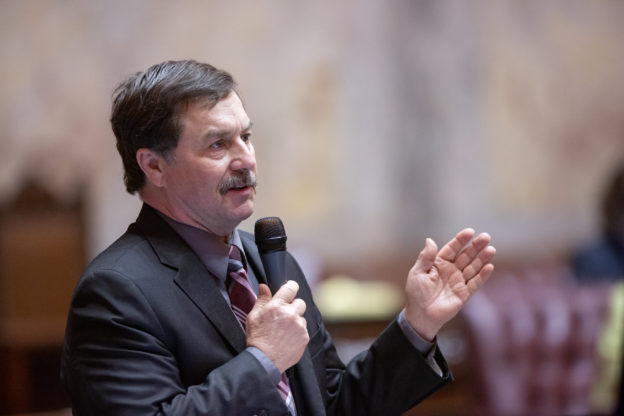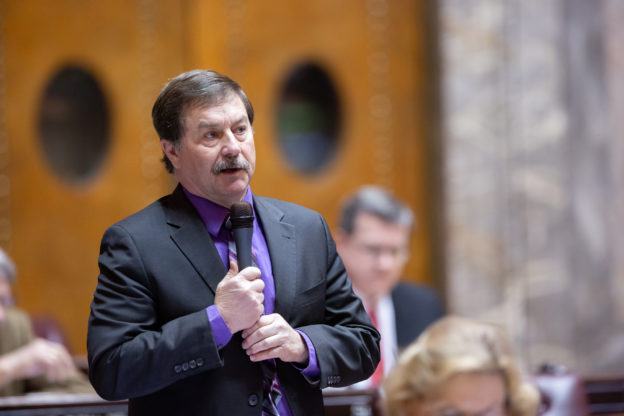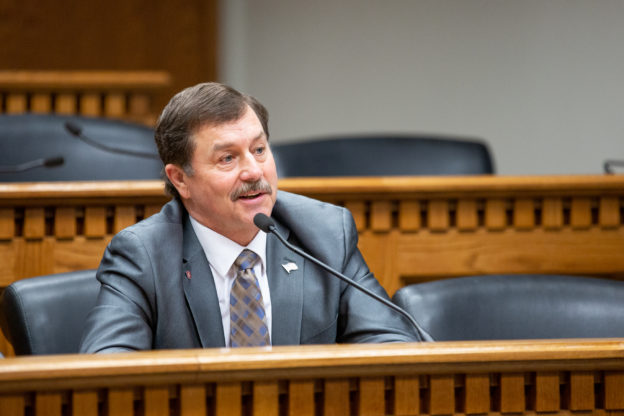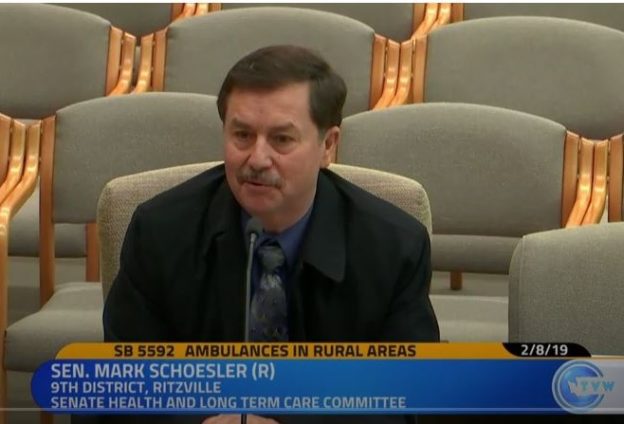Author Archives: brianzylstra
Sen. Mark Schoesler, R-Ritzville, is praising the state Community Economic Revitalization Board’s recent approval of funding for a rural broadband project benefiting Clarkston and Asotin.
During its March 21 meeting, the board chose to award a grant and loan, each in the amount of $207,285, for what is known as the Port of Clarkston to City of Asotin+ fiber expansion project.
“This is very good news for Clarkston and Asotin,” said Schoesler, whose 9th Legislative District includes both cities. “Rural broadband is as important in this century as telephone service was in the 20th century. Once this project is completed, it will really help residents and businesses in both communities.”
According to a letter from the CERB to Schoesler, the project consists of engineering and construction of approximately six miles of primarily aerial fiber. There are two build out components of the Southern expansion: Clarkston Heights to Asotin, and the Westside Expansion, Naslund Disposal Service to Field of Dreams. The CERB funds were matched by $138,190 in local resources.
The full letter from CERB to Schoesler can be viewed here.
State Sens. Sharon Brown, Mark Schoesler and Maureen Walsh are inviting residents in Benton and Franklin counties to take part in a telephone town hall from 6 to 7 p.m. Wednesday, April 3.
Brown, R-Kennewick, serves the 8th Legislative District, which includes part of Benton County. Schoesler, R-Ritzville, represents the 9th Legislative District, which covers most of Franklin County. Walsh, R-Walla Walla, is from the 16th District, which includes parts of Benton and Franklin counties.
Automated phone calls will go out throughout the two counties, but constituents who don’t receive a phone call during the event may call (509) 417-0627 to join in.
The telephone town hall will be similar to a call-in radio program, with the lawmakers providing an update on the 2019 legislative session before taking questions from participants.
“This platform is a great and easy way for us to connect with our constituents from the comfort of their home. It provides us a convenient way to communicate what lawmakers are discussing in Olympia and to learn what issues are important to the people back home,” said Brown, who is Senate Deputy Republican Leader.
“Most of the legislative session already has been completed, but there are several major issues for the Legislature to address during the homestretch, so we look forward to sharing information with people and answering their questions during the telephone town hall,” said Schoesler, who is Senate Republican leader.
Walsh noted that the key decisions of this year’s legislative session will come during the final weeks. “The most controversial bills of the session have yet to receive their final votes, and we haven’t even begun debating proposals for taxes and spending. These are going to be tough battles, and we’re interested in hearing where the people of southeast Washington stand,” said Walsh.
The 2019 legislative session is scheduled to end April 28.
Sen. Mark Schoesler, R-Ritzville, joined his Senate colleagues Monday in unanimously passing a bill that would authorize modernization grants for small school districts in Washington.
Second Substitute Senate Bill 5572 would establish a small school district modernization grant program for school districts and state and tribal compact schools that have 1,000 or fewer enrolled students.
Schoesler, whose 9th Legislative District includes many small school districts, said the grant program created by the bill would help them have access to needed resources so they can modernize or replace school buildings that are aging or in disrepair.
“In many cases, the most property-poor school districts are also the smallest, and passing a bond can be a challenge for them, especially since election-related costs hit small bonds disproportionately harder,” said Schoesler. “Many of these districts don’t have money on hand to make necessary repairs. This bill would go a long ways toward the maintenance and improvement of schools in our state’s smaller districts.”
Based on October 2017 enrollment data, 149 of the 295 school districts statewide have enrollments of 1,000 or fewer students.
Creating a small school district modernization grant program was the top recommendation by the Joint Legislative Task Force on Improving State Funding for School Construction.
The bipartisan bill has been sent to the House for further consideration.
Senate Republican Leader Mark Schoesler, R-Ritzville, issued this statement on Gov. Jay Inslee today signing into law Senate Bill 5273, which will move Washington’s 2020 presidential primary from late May to March but will also require voters to affiliate with either the Democratic or Republican Party in order for their presidential-primary votes to count.
“While I applaud moving Washington’s presidential primary to March so it gives our state’s voters a greater voice in choosing the presidential nominees, I’m disappointed that this legislation will disenfranchise independent-minded voters in our state since many of them will refuse to affiliate with either of the two major parties.
“It’s disappointing and ironic that legislative Democrats, who talk so much about voter access, have passed a bill that will shut out voters who refuse to declare they’re a Democrat or Republican.
“Washington has a long and strong tradition of independent-minded voters. Today will be remembered as a big win for the political parties in Washington but a lost opportunity on behalf of our many voters who value independence and privacy.”
It can be a challenge for very small, rural communities to provide ambulance service for their citizens. A bill prime-sponsored by Sen. Mark Schoesler aims to make it easier for two tiny Whitman County towns, Garfield and Farmington, to continue providing joint ambulance service.
Schoesler’s proposal, Senate Bill 5592, was approved this week by the Senate Health and Long Term Care Committee. The measure is now before the Senate Rules Committee, one step from a full Senate vote.
A 2017 state law allows rural ambulance-service providers to overcome personnel shortages by allowing ambulance drivers who don’t have first aid or medical training. But this new law inadvertently left out ambulance services shared by two or more municipalities, such as Garfield and Farmington.
“The point of this bill is to let shared ambulance services continue operations so these communities don’t have to turn to other providers farther away simply because the driver of the ambulance isn’t trained in first aid,” said Schoesler, R-Ritzville.
The proposal specifically would permit ambulance services established by an association comprising two or more municipalities in a rural area to use a driver without any medical or first-aid training.
“My bill and the law it would update both work because when an ambulance carries a patient to a hospital, the driver really doesn’t have a role in caring for the patient,” said Schoesler. “The EMTs in the back really are the persons in charge. The driver simply needs to be at least 18, pass a background check, and possess a valid driver’s license with no restrictions. This is a common-sense proposal that uses the co-op principle to meet the needs of rural communities.”















